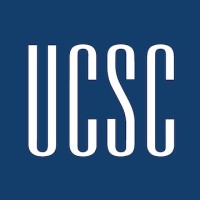Bachelor of Arts in Applied Linguistics and Multilingualism (Bachelors)
UC Santa Cruz
Santa Cruz, CA
Applied linguistics is an interdisciplinary field that seeks to understand how languages are learned (first and second language acquisition), how more than one language is represented and accessed in the mind of the individual (bilingualism), the ways in which language and society intersect (sociolinguistics), how people from different cultural and linguistic backgrounds interact (intercultural communication), and methods and principles of language teaching (pedagogy).
The major in applied linguistics and multilingualism is designed for students who wish to pursue the study of a particular language (e.g., Chinese, French, German, Italian, Japanese, or Spanish), and at the same time, gain an in-depth understanding of language use in bilingual and multilingual settings. Coursework for the major presupposes some familiarity with theoretical linguistics, and thus majors are required to take three foundational courses offered in the Linguistics Department (LING 50; LING 100 or LING 101; LING 111 or LING 112) in addition to APLX 80, the introductory course to applied linguistics. Since applied linguistics is integrally connected to other disciplines such as cognitive and developmental psychology, education, anthropology, and sociology, students have the option of taking some elective courses in these areas. Finally, majors are encouraged to pursue the study of more than one language in order to reflect on and enhance their understanding of the process of second language acquisition.
Mga Resulta ng Pagkatuto ng Programa
Graduates from the applied linguistics and multilingualism studies bachelor of arts program should:
✔ Demonstrate proficiency in a second language. Students who successfully complete the applied linguistics and multilingualism major will reach an Intermediate-high level of proficiency in their second language (L2) as described in the scale of the American Council of Teachers of Foreign Languages (ACTFL). This is similar to the B2 level on the Common European Framework of Reference. Speakers who complete additional course work through study abroad (an aspect of the major that is very much encouraged) may reach the advanced level in their L2.
✔ Be able to analyze critically the contexts and processes of (second and other) language acquisition. Students will develop an in-depth understanding of processes of and issues relating to the acquisition of more than one language, bilingualism and multilingualism, including social, psycholinguistic and metalinguistic aspects of these processes.
✔ Be able to analyze critically the contexts and uses of language in society. Students will gain an in-depth understanding of social aspects of bilingualism and multilingualism, and issues of language in social contexts. Students will also develop an understanding of how different disciplines work together to make sense of human communication in multilingual contexts.
✔ Demonstrate research skills appropriate for the field of applied linguistics, such as collecting and analyzing data. Students will develop the receptive and productive skills necessary for becoming members of this community of practice. Specifically, they will develop the disciplinary skills to summarize, interpret and critique both quantitative and qualitative research studies in applied linguistics. Through this process, students will develop the ability to engage in independent reading of scientific texts and research articles, to design basic research projects as well as to collect, analyze, and write about applied linguistic data.
✔ Demonstrate effective written and oral communication appropriate for the discipline of applied linguistics. Students will learn how to review and report on relevant applied linguistic research critically, using discipline-appropriate conventions in written and oral presentations (i.e., expected content, organization, register, and language).












